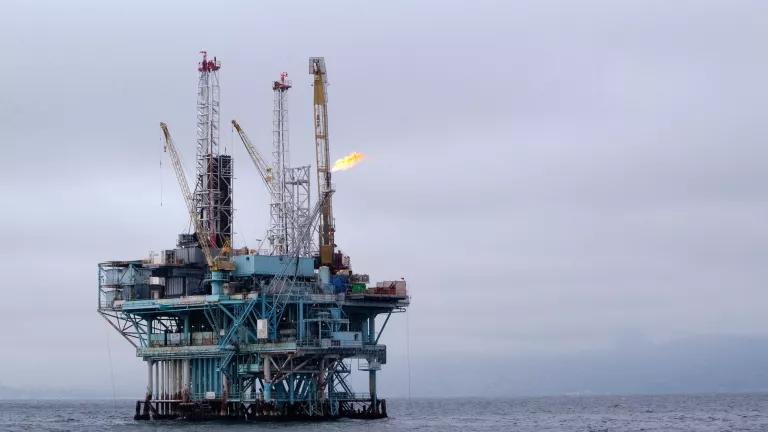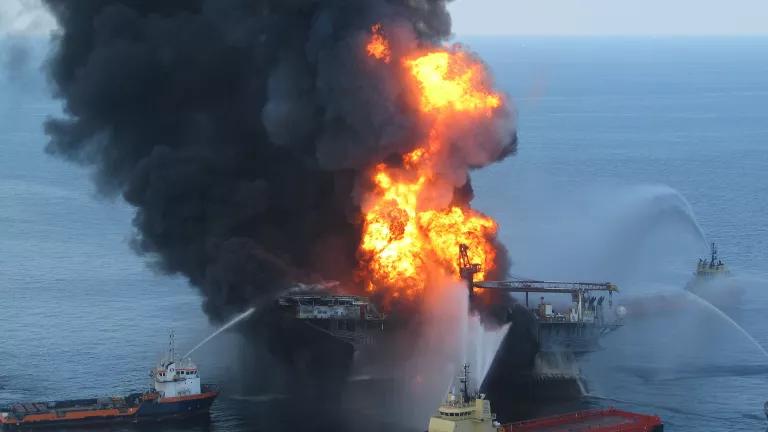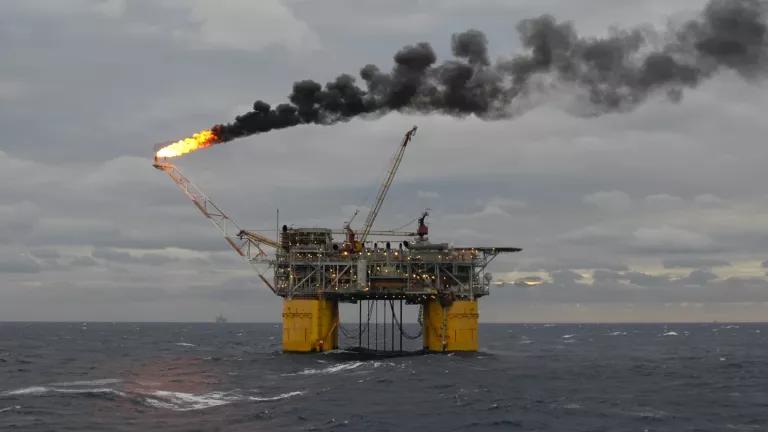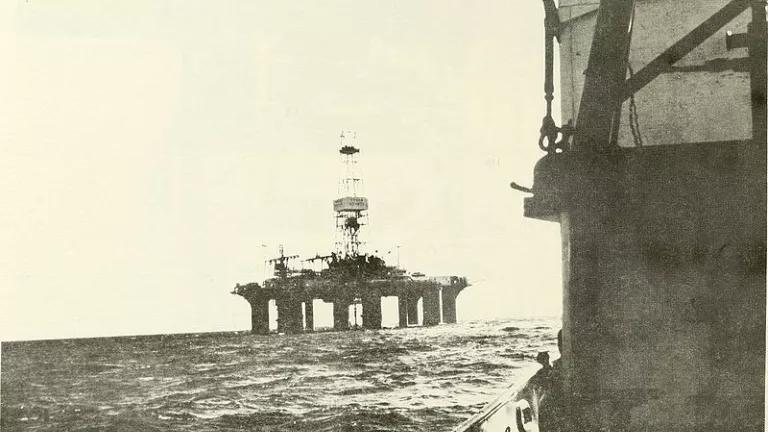A Year in Review: Offshore Oil and Gas Leasing
Litigation, legislation, advocacy: our snapshot of NRDC’s work to stop new offshore drilling in 2023.

It was a big year for our advocacy opposing new offshore oil and gas leasing. Before the fight continues in 2024, we’re excited to share some of the moments that happened this year in the fight to end new offshore leasing in 2023.
Just this week, the Biden Administration held the last congressionally mandated lease sale as laid out in the Inflation Reduction Act (IRA). Lease Sale 261 took place in the Gulf of Mexico, and just under 73 million acres of our ocean were available for oil companies to bid on. This lease sale was canceled by the Biden Administration back in 2021, but has returned due to congressional mandates in the IRA. NRDC and partners sued.
Also in December, the Biden Administration finalized the federal offshore leasing program that lays out the offshore oil and gas leasing schedule for the next five years. This five-year program included a record-low of 3 scheduled lease sales exclusively in the Gulf of Mexico. It is clear with the release of the program that the administration recognizes the need to reduce our reliance on fossil fuels. Even in the announcement of the plan, the emphasis was on offshore wind, "In compliance with the terms of the [Inflation Reduction Act], these three proposed lease sales are the minimum number that will enable the Interior Department to continue to expand its offshore wind leasing program through 2030.” "While this is the lowest number of sales ever offered, three sales is still too many.
The public was clear in their ask for no new offshore oil and gas leasing. Collectively, over 900,000 public comments demanded that the administration offer no new leases. Over 200 groups, businesses, and organizations delivered a letter to the administration asking to stop giving our ocean to polluters. We wrote about the impacts of continued offshore drilling to wildlife, climate, and human health. New analysis showed that demand for oil will fall dramatically over the next three decades, eliminating the need for more offshore leasing. People across the country penned op-eds asking to put people over polluters - from the Miami Herald to the Houston Chronicle to The Messenger.
Pattie Gonia and other influencers spoke up this summer about why we don't need any new offshore oil and gas leasing
In November, the Gulf faced another major oil spill - the second largest since the BP Deepwater Horizon Disaster. Oil spills are an unavoidable consequence of offshore drilling and can inflict long-lasting harm on local ecosystems and wildlife. This latest spill was a stark reminder of the consequences of offshore drilling.
Notably this year, the Gulf of Mexico’s Rice’s whale got time in the spotlight. These whales are among the most endangered marine mammal species on the planet; experts estimate fewer than 100 currently remain. Rice’s whales are victims of the industrialized waters of the Gulf and are directly threatened by oil and gas development. While BOEM took positive steps by initially excluding Rice’s whale habitat from Lease Sale 261 and establishing a speed limit to reduce the risk of deadly vessel collisions, the fossil fuel industry immediately challenged the sale-specific protections for the whale in court. Unfortunately, a federal district court in Louisiana ruled in favor of industry, requiring BOEM to offer Rice’s whale habitat for lease. The Fifth Circuit Court of Appeals upheld this decision, frustrating BOEM’s efforts to protect Rice’s whales from oil and gas activities.
2023 was a jaw-dropping year for oil and gas industry profits, and fossil fuel production once again reached a record high. Instead of using their billions in profits to make progress on the renewable energy transition, fossil fuel companies doubled down on oil and gas, and worked to consolidate operations in the Permian basin through mergers and acquisitions.
It was a big year for Congress as well. Members introduced bills to ban offshore drilling off their coasts - including the West Coast Protection Act (S.22/H.R.470), the COAST Anti-Drilling Act (S.617/H.R. 1320), the Defend our Coast Act (H.R. 1327), and the Florida Coastal Protection Act (H.R. 1443) to name a few. By introducing and joining these bills, members made it clear that they didn’t want offshore drilling to be the future for their coasts. Members also sought to remove the linkage between wind and oil and gas from the IRA with the NOW Act (H.R. 4965/S.3026).
We also saw an onslaught of legislative attacks - the House Interior Appropriations bill had terrible provisions that would have mandated offshore leasing. There was language designed to undermine the critically endangered Rice’s whale and expose it to further threats from the oil and gas industry and beyond. We worked with champions in the House and the Senate to defend against offshore drilling language that would undercut our ability to combat the climate crisis and threaten communities. For more detail on where your representatives stand on offshore drilling, take a look at the offshore drilling tracker.
Back in the spring, there was another IRA mandated oil and gas lease sale in the Gulf of Mexico. Lease Sale 259 was one of the largest lease sales in U.S. history, and raised serious threats to climate, Gulf communities, and endangered species. NRDC and partners sued.
This year began on the heels of an offshore lease in Cook Inlet, Alaska. Lease Sale 258 threatened people, wildlife and our climate. In what is a theme of this year, NRDC and our partners sued.
In more hopeful news, the White House also released an Ocean Climate Action Plan and an Ocean Justice Strategy, both positive steps towards seeing the ocean as a source of solutions, rather than a source of carbon emissions.
Looking back on this year, it is clear that the NRDC and the public were loud and clear about our opposition to more oil and gas leasing. We fought back bad legislative language, sued on big lease sales, and are ending the year with the smallest leasing plan in history. The work does not end here, we will continue to work alongside our partners in the Gulf and beyond to stand up to the fossil fuel industry and work to ensure that people are more important than polluters. We’ll need everyone’s help in 2024 as we continue to work towards a fossil fuel phase out and protect our coasts and climate from the dangers of offshore drilling. Until next year!





